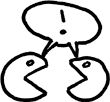

Working memory is your brain’s temporary storage. It’s where information’s briefly held before it’s passed into the brain for deeper storage, and where memory sits when recalled from the brain for use. It also releases unneeded information to the great circular file of forgetting. As its name implies, working memory is where we work—it holds the beginnings of sentences long enough for you to extract meaning from them at the end.
It also depends on dopamine synapses. It’s at these junctions that information passes into and out of working memory. And so the more dopamine receptors you have (places where dopamine synapses can attach), the better your working memory.

Golfers instructed to avoid a specific mistake, like overshooting, do it more often when under pressure. Soccer players told to shoot a penalty kick anywhere but at a certain spot of the net, like the lower right corner, look at that spot more often than any other.
—Benedict Carey,
New York Times
And using your working memory to do crosswords actually creates more dopamine receptors in areas of the brain relevant to working memory. In other words, doing the crossword sculpts the biology of your brain for better recall.